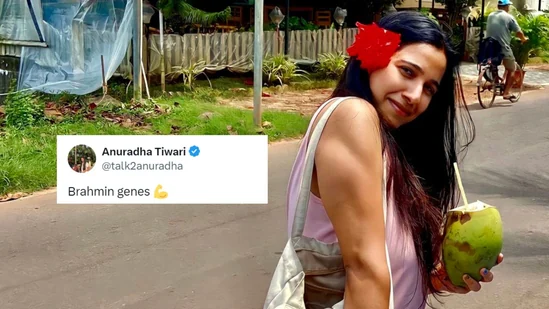
Bengaluru CEO flexes Brahmin genes in a recent social media post that has ignited a massive controversy and drawn widespread criticism for promoting casteism. Anuradha Tiwari, the CEO of content writing company JustBurstOut, took to the social media platform X (formerly known as Twitter) to share a photo of herself flexing her muscles, captioned provocatively as “Brahmin genes.”
The post quickly went viral, amassing over 1.3 million views within a day and sparking intense debates on social media regarding caste privilege and discrimination. Many users condemned Tiwari’s caption as casteist, accusing her of perpetuating outdated and divisive ideologies.
The Controversial Post
Anuradha Tiwari shared a photograph on X showcasing her toned physique with the caption, “Brahmin genes.” The post was intended to highlight her fitness, but the reference to caste immediately drew sharp criticism from various quarters. Critics argued that attributing physical fitness to one’s caste promotes a sense of superiority and undermines the fight against caste-based discrimination.
Anuradha Tiwari is a well-known entrepreneur based in Bengaluru and serves as the CEO of JustBurstOut, a content writing firm. She is also recognized as a TEDx speaker and has been vocal about her views on India’s reservation system. Tiwari’s X bio reflects her stance against caste-based reservations, advocating for the principle of “One Family, One Reservation.”
“I am a general category student. My ancestors have passed me down 0.00 acres of land. I live in a rented house. I couldn’t get admission despite scoring 95% but my classmate who scored 60% & comes from a well-off family gets admission. And you ask me why I have a problem with reservation?”
More recently, she urged individuals from the general category to unite within five years, cautioning that failure to do so could lead to the implementation of reservations in the private sector as well.
Social Media Backlash
The recent post where the Bengaluru CEO flexes Brahmin genes has been met with severe backlash on social media platforms. Hundreds of users criticized Tiwari for promoting casteism and called for more responsible use of social media influence.
Supreme Court advocate Shashank Ratnoo responded to the post by saying:
“Precisely why casteism is still present! Being fit is good but attributing that to superior or specific genes, not the way to build one family one India.”
Another user commented:
“While flexing her caste she fights for anti-reservation. How typical.”
Many pointed out the irony in Tiwari’s stance against reservation while simultaneously flaunting caste identity. Some users also referenced historical texts and social reformers to highlight the progress made against oppressive caste structures.
One user remarked:
“According to the Manusmriti, girls should stay at home all the time, take care of their husbands, and do nothing else. But because of the constitution, you’re flexing your triceps on Twitter and living life your own way. So go ahead and thank Babasaheb Ambedkar for that!”
Another added:
“Whom do we owe for our ability to work out and live life on our own terms? Dr. Ambedkar (both for the constitution and the Hindu code bill) and a series of other progressive voices for decades.”
Ongoing Debate
The incident where the Bengaluru CEO flexes Brahmin genes has reignited discussions about casteism in modern India and the role of social media in perpetuating or challenging societal norms. While some supporters defend Tiwari’s right to express pride in her heritage, many others view such expressions as harmful and regressive.
The debate also touches upon broader issues such as equality, meritocracy, and the effectiveness of reservation policies in addressing historical injustices. As the conversation continues, it underscores the need for sensitivity and awareness when discussing topics related to caste and social hierarchy.
Conclusion
The controversy surrounding Anuradha Tiwari’s post serves as a reminder of the deep-rooted complexities associated with caste in India. As social media continues to be a powerful tool for expression, it also holds the potential to either bridge divides or deepen them, depending on how responsibly it is used. The incident has sparked necessary conversations about casteism, privilege, and social responsibility in contemporary society.
Stay tuned to News Now Nation for updates and more news.
Follow us on social media for real-time news updates:






